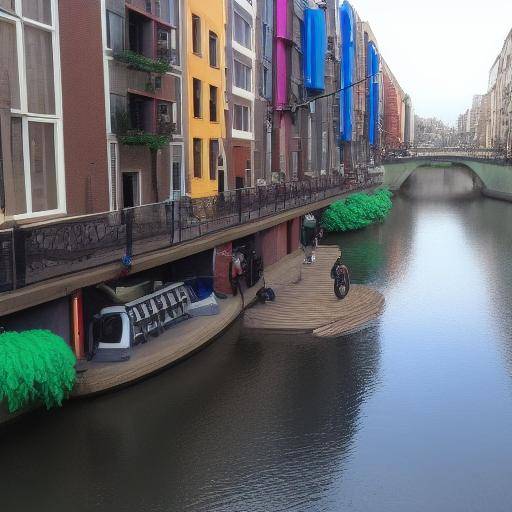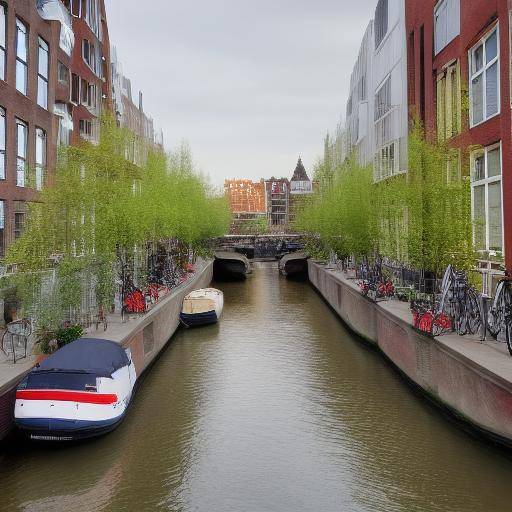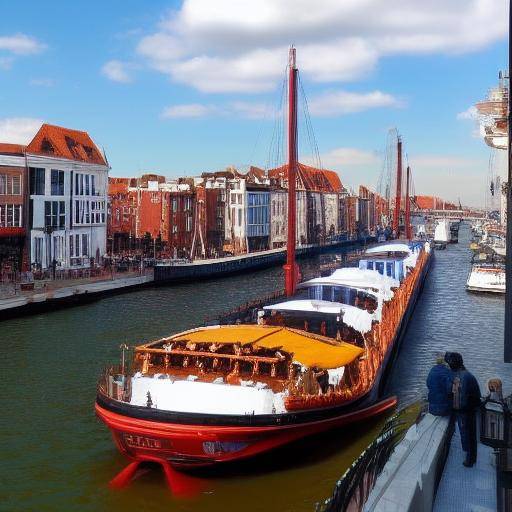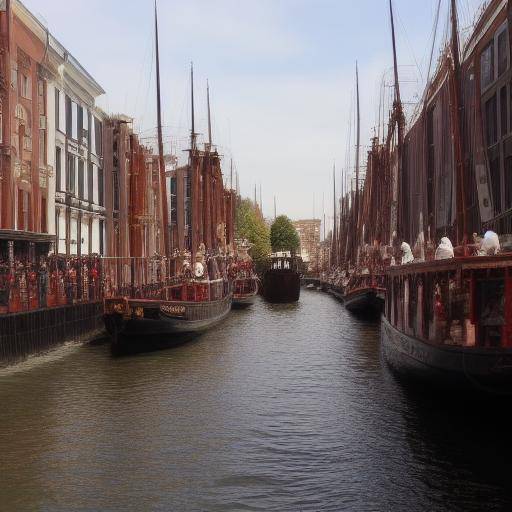
In the vibrant city of Amsterdam, sustainability emerges as a fundamental principle. The iconic channels are much more than a tourist attraction; they are symbols of an ecological approach that is reflected in urban ecotourism and the sustainability of the city. In this article, we will explore how the canals of Amsterdam intertwine with sustainability and the unique experience of cycling them. We will discover history, benefits, challenges, practical applications, future trends and much more. Prepare to immerse yourself in a journey that will take you through the fascinating canals of Amsterdam while exploring its commitment to sustainability and urban ecotourism.
Introduction
Amsterdam, a city recognized by its iconic channels and sustainable practices, has been a pioneer in urban ecotourism. As the world seeks innovative ways of preserving the environment, Amsterdam has adopted a progressive approach to sustainability. In this article, we will discover how the city has integrated its channels into a sustainable and enriching experience, exploring its history, implications and impact on the community. Focus on the Amsterdam Canals, urban ecotourism and sustainability in the city as you immerse yourself in a journey that combines historical wealth with a future approach to environmental conservation.
History and Background
The Amsterdam Canals, a UNESCO World Heritage Site, have a rich history dating back to the seventeenth century. In this section we will explore the origin of the canals, their historical importance and their evolution to become a symbol of sustainability and urban ecotourism. We will know the key dates, relevant figures and significant milestones that have shaped these impressive channels.
Origins and Channel Development
The origins of Amsterdam's canals go back to the Dutch Golden Age. In the seventeenth century, the city experienced an economic boom, leading to the creation of a network of interconnected channels to facilitate the transport of goods and people. Channel network planning was an innovative milestone that contributed to the transformation of Amsterdam into a prosperous shopping centre.
During this period, three main semicircular channels were excavated, known as Herengracht, Keizersgracht and Prinsengracht, and bridges and houses were built along their banks. These channels not only served as transport routes, but also became a symbol of the economic power and cultural influence of the city.
Evolution and Adaptation
Over time, the commercial importance of the channels decreased, and the approach moved towards its historical and landscape value. In the 20th century, channels faced threats of degradation and obstruction, leading to the implementation of conservation and revitalization initiatives. The commitment to preserve the heritage of the canals has been critical to its evolution towards a sustainable and environmentally friendly destination.
Sustainability of the Amsterdam Canals
Amsterdam ' s commitment to sustainability is reflected in the management and preservation of its channels. The city has implemented innovative measures to maintain water quality, preserve historical architecture and promote the sustainable use of channels. These initiatives have contributed to the promotion of urban ecotourism and the development of environmental policies that guarantee the long-term conservation of this invaluable cultural heritage.
Urban Ecotourism: A Sustainable Approach
In the context of Amsterdam channels, urban ecotourism has become a unique way of experiencing sustainability. The use of electric bikes to explore channels not only reduces the carbon footprint, but also allows visitors to connect with the environment in a way that respects the environment. This approach reflects the commitment of the city to sustainable mobility and the preservation of its natural resources.
Analysis in Deep
In this section, we will discuss in detail the current benefits, challenges and trends related to the canals of Amsterdam, urban ecotourism and sustainability in the city. We will explore statistics, case studies and examples of the real world to understand how these areas are intertwined to create an enriching and sustainable experience for visitors and the local community.
Benefits of Urban Ecotourism in Amsterdam Channels
Urban ecotourism in the canals of Amsterdam has a number of significant benefits for both the city and visitors. Tourists can enjoy a unique and sustainable experience as they travel through electric bike channels, allowing them to explore the city in an environmentally friendly and environmentally friendly way. This form of tourism promotes greater appreciation for the sustainability and conservation of the historical and natural heritage of Amsterdam.
In addition, urban ecotourism contributes to the promotion of sustainable practices, encourages the adoption of environmentally friendly modes of transport and promotes ecological awareness among visitors. This integrated approach benefits the city by reducing vehicle congestion and carbon emissions, while promoting a more active and healthy lifestyle.
Challenges and Considerations
Despite the many benefits of urban ecotourism in the canals of Amsterdam, there are challenges and considerations that need to be addressed to ensure their long-term sustainability. The effective management of the flow of tourists and the conservation of natural and cultural resources are critical issues that require continued attention. It is essential to balance the preservation of the environment with the satisfaction of tourist demand, ensuring that experiences are authentic and respectful with the local community.
Another important challenge lies in the need to promote responsible tourism that respects the integrity of channels and their environment. Education and awareness-raising play a crucial role in promoting sustainable behaviour among visitors, fostering greater commitment to the conservation and respect for the heritage of the city.
Current Trends and Futures in Amsterdam Channels
Amsterdam channels continue to evolve to adapt to current and future trends in urban sustainability and ecotourism. The implementation of innovative technologies, such as renewable energy systems and sustainable mobility solutions, is transforming the way visitors explore and experience channels. Amsterdam has become a living laboratory of sustainable practices, and emerging trends point towards a future where sustainability and tourism are harmoniously integrated and enriching.
This evolution reflects the continued commitment of the city to sustainable innovation and the promotion of an urban environment that respects both history and the environment. As the canals of Amsterdam adapt to new global realities, exciting opportunities arise to enrich the experience of visitors and ensure the long-term conservation of this invaluable heritage.
Comprehensive review
In this section, we will explore practical applications, best practices, comparisons and critical analysis related to the Amsterdam Canals, urban ecotourism and sustainability in the city. We will analyze different approaches, case studies and expert opinions to understand how these areas interconnect and contribute to a comprehensive experience that prioritizes sustainability and preservation of the environment.
Practices and Best Practices
The integration of electric bikes as a means of exploring the canals of Amsterdam represents a practical application and a better practice of urban ecotourism. This approach not only offers tourists a sustainable experience, but also fosters an active and healthy lifestyle. The promotion of sustainable mobility through well-developed cyclist infrastructure and access to electric bicycles reflects a better practice in tourism management and the promotion of urban sustainability.
In addition, the canal conservation and restoration initiatives, which seek to preserve their historical heritage and ensure water quality, represent practical applications with tangible results in terms of sustainability. These exemplary practices provide a framework for future interventions and guide the sustainable development of the Amsterdam channels.
Comparative analysis
A comparative analysis of urban sustainability and ecotourism approaches in the canals of Amsterdam reveals the integration of sustainable principles in urban planning and the management of tourist destinations. Compare different methods and strategies allows us to identify both opportunities and challenges in the evolution of sustainable practices. By examining other destinations with similar approaches, we can get valuable information on innovative solutions and successful adaptations that could inspire the future management of the Amsterdam channels.
Pros and Contras Analysis
The analysis of pros and cons of sustainable practices in the canals of Amsterdam allows us to evaluate in a balanced way the implications of these initiatives. While the benefits are evident in terms of heritage conservation, reducing the carbon footprint and promoting more conscious tourism, there are also challenges to be addressed. Tourist congestion, the preservation of cultural authenticity and the management of natural resources are aspects that require a strategic approach and continued collaboration among stakeholders.
This critical analysis helps us to understand the complexity of the balance between the preservation of historical heritage and the promotion of sustainable practices in a dynamic urban context, such as Amsterdam.
Conclusions
Amsterdam's commitment to urban sustainability and ecotourism in its iconic channels is an inspiring example of how history, innovation and conservation can converge to create a unique and environmentally friendly experience. As visitors explore electric bike channels, they participate in a journey that not only celebrates the historic beauty of the city, but also promotes ecological awareness and respect for cultural heritage.
In a world that seeks sustainable solutions, the Amsterdam channels offer a window to an integrated approach that places conservation and tourism in harmony, showing that it is possible to preserve the past while holding the future responsibly. This unique combination of traveler history, sustainability and experience symbolizes the path to more conscious tourism and a more environmentally friendly urbanism.
FAQS
1. What is the best time to explore the canals of Amsterdam by electric bike?
Spring and summer offer ideal weather conditions to enjoy an electric bike ride through the canals of Amsterdam. Soft temperatures and the blossoming of nature enhance the experience and allow a more comfortable and pleasant exploration.
2. Are there guided electric bike tours that address the sustainability of Amsterdam's canals?
Yes, there are specialized guided tours that offer a unique perspective on the sustainability of Amsterdam channels. These routes combine historical information with contemporary sustainability approaches, providing participants with an integral understanding of the ecological and cultural importance of the channels.
3. What are the environmental benefits of using electric bikes instead of other means of transportation to explore Amsterdam's canals?
The use of electric bicycles reduces carbon emissions and the environmental impact associated with traditional means of transport, such as cars or tourist buses. In addition, it promotes a more sustainable mode of tourism and offers a more connected experience with the natural environment of the city.
4. How do electric bike tours contribute to the local economy and the sustainability of Amsterdam?
Electric bike tours offer significant opportunities to support the local economy by promoting sustainable tourism. By choosing guided tours and local services, visitors contribute directly to the economic growth of the community and help preserve the authenticity of the destination.
5. Are electric bikes accessible to all visitors interested in exploring the canals of Amsterdam?
Electric bicycles offer an accessible option for a wide range of visitors, including older people or those with different levels of physical condition. Its ability to facilitate less demanding journeys from a physical standpoint makes them an inclusive option to enjoy the charms of Amsterdam's canals.
6. What are the safety measures and regulations for the use of electric bicycles in Amsterdam?
Amsterdam has a well-developed infrastructure for bike mobility, with clearly marked routes and traffic regulations that promote the safety of cyclists. It is important to respect local traffic rules and use protective helmets, in addition to being aware of the behavior of the other users of the road.
In conclusion, the canals of Amsterdam offer a unique perspective on the city's commitment to urban sustainability and ecotourism. The combination of the rich history of canals with the promotion of sustainable tourism practices shows how the preservation of cultural heritage can converge with the search for environmental solutions. As you travel through the electric bike channels, visitors participate in an experience that honors the past in a respectful way with the environment, marking the way to a more conscious tourism and a more sustainable urbanism in the 21st century.
Sources
- UNESCO World Heritage Centre - Amsterdam
- Amsterdam City Council - Amsterdam Channels: A Unique Treasure
- Ministry of Water Infrastructure and Management of the Netherlands - Clean channels




